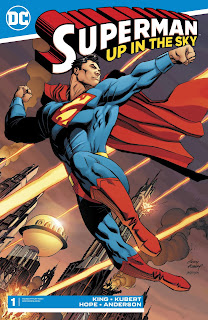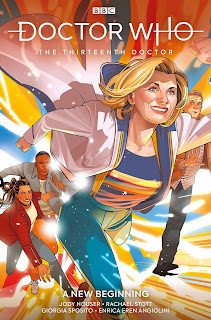Over the past several months, I've found myself going back repeatedly to the Jodie Whittaker episodes of Doctor Who. I've been watching the show since the Tom Baker days in the late 1970s; I've enjoyed every incarnation to varying degrees and I quite like Whittaker's take on the character. But that's not why I keep going back to her episodes. I keep going back because one of her character's themes is hope, something which I find myself in short supply of lately.
The more I thought about it, though, the more curious that idea became. Not that I'm looking for an expression of hope, but that I find myself more drawn to it through Doctor Who than I do through a comic book character like Superman. After all, I was reading about superheroes generally and Superman in particular for several years before seeing Tom Baker for the first time, and I'm a much bigger fan of comic books than any other medium. So why am I seeking solace somewhere other than my usual go-to?
The question is even more interesting when you compare the two characters. Superman, of course, has god-like powers and does good just because it's the right thing to do. While the Doctor doesn't have the same power set as Superman, her intellect combined with the technology she has at her disposal is pretty comparable. So while Superman might be able to physically shift the flight of a careening airplane, the Doctor might "reverse the polarity of the neutron flow" using her sonic screwdriver to achieve the same result. And she also does good because it's the right thing to do.
I don't know exactly when creators started being explicit about Superman standing for hope. I think it was Mark Waid who first used the idea of the S-shield as symbolizing hope on Krypton, but I know I've seen people talking about the hope they find in Superman before that. Certainly, Christopher Reeve used the metaphor repeatedly. For the Doctor, while hope has been mentioned before, it's become more emblematic of Whittaker's Doctor than previous incarnations. You could say there's some similarities here again, in that while both characters represent hope, that is a new (relative to how long the characters have been around) idea.
I think, though, that perhaps the two characters represent different kinds of hope.
Superman's version of hope can be summed up in part of Marlon Brando's speech used in the Superman and Superman Returns movies. "They can be a great people, Kal-El. They wish to be. They only lack the light to show the way. For this reason, above all, their capacity for good, I have sent them you, my only son."
And that's the part that doesn't capture my interest about Superman's hope. What's wrapped up in the character is that Superman himself is the answer. Superman is a savior character. The sense of hope that comes with Superman is that he will be the one to save the day. "Don't worry! Superman will save us!" The problem I have with that is that it's an absolution of one's own agency. You don't have to really do anything, just hang around, and someone else will catch you.
While the Doctor certainly does come in to save the day, she acts more as an empowering agent, helping the regular folks to save themselves. There's a telling line towards the end of "The Tsuranga Conundrum" where Mabli is thanking the Doctor and her companions for their help and says, "You all were [brilliant]. Light in dark times." The Doctor responds, "People prevail. Hope prevails." What's key is that she leads with people. She isn't the beacon of light to be followed, but people themselves are their own light that just need a chance to shine. She assists in giving people agency, not in taking it away.
I could get into why that idea resonates with me personally, and how that fits into my philosophical and theological ideas, but suffice it to say that I am very much in tune with the idea of being responsible for myself. Interesting. I never really though about those two characters in precisely those terms before.








0 comments:
Post a Comment